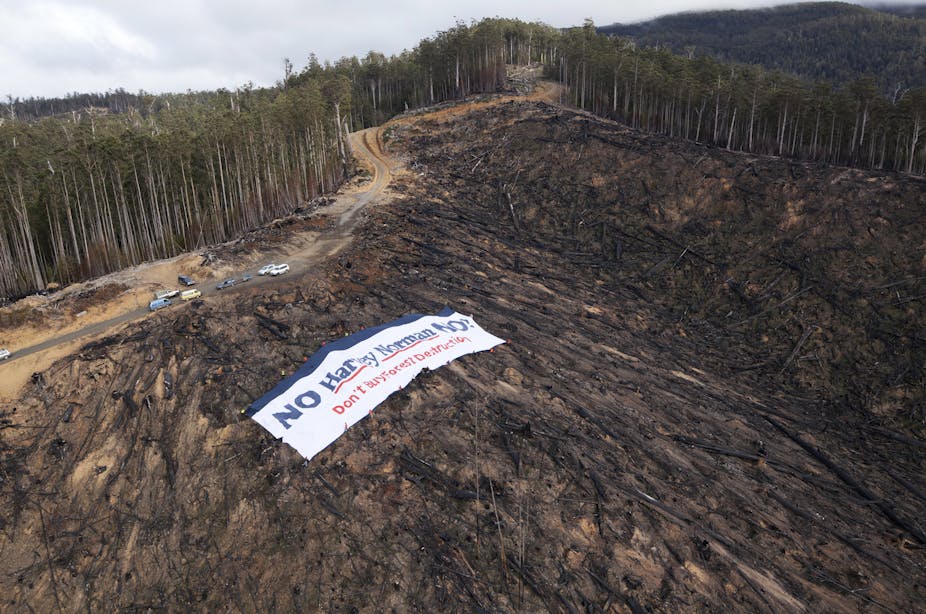In October 2000, I was driving through downtown Boise, Idaho, and nearly careered off the road. Just in front of me was a giant inflatable Godzilla-like dinosaur, well over 30m tall. It was towering over the headquarters of Boise Cascade, one of North America’s biggest wood products corporations. For years, the firm had been tangling with environmental groups who blamed the company’s logging practices for declines in the extent of old-growth forests across the globe.
The huge inflatable reptile was the inspired idea of the Rainforest Action Network, who used it to label Boise Cascade a dinosaur of the timber industry. The blow-up dinosaur was headline news across the United States and the label stuck. Although Boise Cascade tried to deny it was yielding to environmental pressure, it ultimately agreed to phase out all of its old-growth wood products.
Environmental campaigns such as this one have become an increasingly important arrow in the quiver of conservation groups, for a very good reason. The world has become hyper-corporatised and globalised, with the result that, as I reported in 2008, deforestation is now substantially driven by major industries rather than by the exploits of poor people trying to make a living off the land.
Campaigns and boycotts get the attention of these large corporations, because they hit them where it hurts: their reputation and market share.
Last-ditch tactics
Boycotts are typically a last resort. The Rainforest Action Network tried for years to nudge, cajole and finally pressure Boise Cascade to phase out old-growth products, without success. Its gentler tactics worked fine with other big corporations such as Home Depot and Lowe’s, but it took a gigantic dinosaur to get Boise Cascade’s attention.
Globally, some of the most impressive environmental achievements have come via boycotts, or at least the threat of them. Just in the past year, four of the world’s biggest forest-destroying corporations have announced new “no deforestation” policies in response to such environmental pressures.
Among the worst of these was Asia Pulp & Paper, whose reputation had become so synonymous with rainforest destruction that the retailers selling its products began fleeing in droves. Today, the corporation has ostensibly turned over a new leaf and even thanked Greenpeace – one of its most persistent critics – for helping it to see the light.
Across the globe, boycotts have helped to rein in predatory behaviour by timber, oil palm, soy, seafood and other corporations. They have led to impressive environmental benefits, such as a landmark forestry peace deal in Canada and a pledge by Australia’s major supermarkets to stock sustainably-sourced tuna.
Banning boycotts?
But now, the power of boycotts might be on the brink of being reined in, after the federal government floated the idea of banning organised boycotts of companies on environmental grounds.
The move has sparked apoplexy among free-speech advocates, and came as a surprise even to observers whose expectations had already been lowered by the Commonwealth’s plan to devolve environmental powers to the states and territories.
Parliamentary agriculture secretary Richard Colbeck said the move would be aimed at “dishonest campaigns”, singling out the campaign against furniture retailer Harvey Norman, which activists accuse of logging native forests.
“They can say what they like, they can campaign about what they like, they can have a point of view, but they should not be able to run a specific business-focused or market-focused campaign, and they should not be able to say things that are not true,” Colbeck told Guardian Australia.
At odds with free speech
Predictably, environmental groups are unimpressed. Reece Turner, a forests campaigner with Greenpeace-Australia, told me:
This policy is at odds with the Liberal party’s professed commitment to uninhibited free speech. The Coalition is going to remarkable extremes to protect big industry from campaigns that are essentially focused on greater transparency of business practices. These campaigns are designed to inform consumer choices – something the Liberal party should be supporting.
One of the more notable aspects of the proposed ban is that it could directly conflict with the Coalition’s stated environmental priorities – one of which is a desire to slow global rainforest destruction as a means to combat global warming.
Of all the environmental actions undertaken to date, boycotts have probably had the greatest direct benefit for rainforests.
As an aside, the Coalition government has recently struggled to find a consistent line on both environmentalism and free speech. Straight after taking office it scuttled the Climate Commission, and is currently fighting to repeal a raft of other carbon policies. Yet it has also announced that Australia will use this year’s Brisbane G20 summit as a “catalyst” to help China, India, Europe and the United States to cut their carbon emissions.
At this early stage, it’s difficult to say whether or not the proposed ban on environmental boycotts will solidify into firm Coalition policy or merely fade away, its proponents having realised this could be too polarising an idea. Let’s hope for the latter. This is a scheme that deserves to go the way of the dinosaurs.

